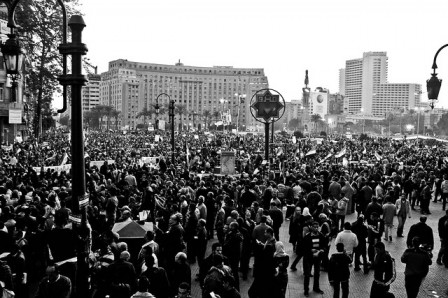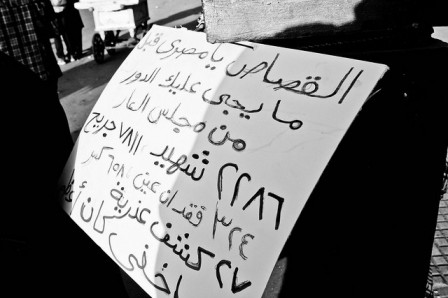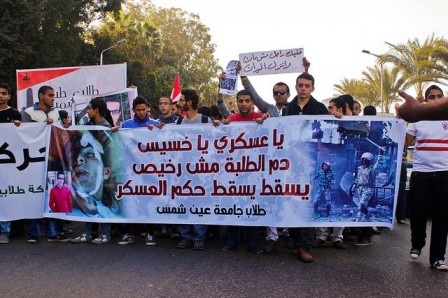Are Islamist Fundamentalists Hijacking The Arab Revolution?

NEWS JUNKIE POST
Dec 23, 2011 at 1:40 pm Either in Egypt, Tunisia or Libya, Islamist parties are making some serious gains in the political power plays following the Arab revolution. It is the case for Tunisia and Egypt, and it is likely to spread to Libya in the post-Qaddafi era. It could happen in Syria, unless the Al-Assad brothers maintain their brutal grip on power.
Either in Egypt, Tunisia or Libya, Islamist parties are making some serious gains in the political power plays following the Arab revolution. It is the case for Tunisia and Egypt, and it is likely to spread to Libya in the post-Qaddafi era. It could happen in Syria, unless the Al-Assad brothers maintain their brutal grip on power.
 In Egypt, as the revolutionaries valiantly fight the military and police in Cairo’s Tahrir Square and elsewhere, Egyptian women have been in the front line for days. However, the Slalafis, which are likely to form a government coalition with the more moderate Muslim Brotherhood, are proponents of Sharia law. If they have a deciding say in this likely power sharing configuration with the Muslim Brotherhood, the Salafis would try to curtail women’s rights, freedom of speech and civil rights, and it would be a de-facto hijacking of Egypt’s revolution.
In Egypt, as the revolutionaries valiantly fight the military and police in Cairo’s Tahrir Square and elsewhere, Egyptian women have been in the front line for days. However, the Slalafis, which are likely to form a government coalition with the more moderate Muslim Brotherhood, are proponents of Sharia law. If they have a deciding say in this likely power sharing configuration with the Muslim Brotherhood, the Salafis would try to curtail women’s rights, freedom of speech and civil rights, and it would be a de-facto hijacking of Egypt’s revolution.
 The Muslim Brotherhood is well placed to be Egypt’s new power broker, but they will have to form a coalition government with either the liberals or the Salafis. But the pressing issue for Egypt right now is not how this power sharing between parties will be set, but more how to deal with the Egyptian military. Some Egyptian revolutionaries believed wrongly that getting rid of Mubarak would end the quasi military dictatorship which has been the burden of Egypt for three decades. However, it has not. The Egyptian military and security forces of Mubarak are still ultimately, at least for the moment, in control of the country’s affairs.
The Muslim Brotherhood is well placed to be Egypt’s new power broker, but they will have to form a coalition government with either the liberals or the Salafis. But the pressing issue for Egypt right now is not how this power sharing between parties will be set, but more how to deal with the Egyptian military. Some Egyptian revolutionaries believed wrongly that getting rid of Mubarak would end the quasi military dictatorship which has been the burden of Egypt for three decades. However, it has not. The Egyptian military and security forces of Mubarak are still ultimately, at least for the moment, in control of the country’s affairs.
 Despite the somehow surprising elections, Egypt’s revolution is still a work in progress similar to the other revolutions in the Arab world. The Obama administration while “condemning the brutality” committed by the Egyptian military thru the State Department, would probably gladly see the military stay as the real power in the country. This calculation is mainly based on the interests of Israel which would rather have the military in the driver seat as opposed the Muslim Brotherhood or even worse the Salafis.
Despite the somehow surprising elections, Egypt’s revolution is still a work in progress similar to the other revolutions in the Arab world. The Obama administration while “condemning the brutality” committed by the Egyptian military thru the State Department, would probably gladly see the military stay as the real power in the country. This calculation is mainly based on the interests of Israel which would rather have the military in the driver seat as opposed the Muslim Brotherhood or even worse the Salafis.
 With Syria facing an increasingly brutal crackdown, Libya in limbo and Egypt entering a second phase of the revolution, the Arab revolution is in flux and the Middle-East is still in geopolitical turmoil. While NATO is unlikely to intervene in Syria against the al-Assad regime, the West is definitely pulling some political strings in post Qaddafi Libya. This general uncertainty in the Arab world has been amplified by the recent US military official departure from Iraq.
With Syria facing an increasingly brutal crackdown, Libya in limbo and Egypt entering a second phase of the revolution, the Arab revolution is in flux and the Middle-East is still in geopolitical turmoil. While NATO is unlikely to intervene in Syria against the al-Assad regime, the West is definitely pulling some political strings in post Qaddafi Libya. This general uncertainty in the Arab world has been amplified by the recent US military official departure from Iraq.
 Yesterday was a day of carnage in Iraq with 19 bombings. The incidents are a clear indication that the sectarian conflict between Shiites, Sunnis and Kurds could re-ignite full tilt at any given moment. With the US military gone, it seems that the government of Prime Minister al-Maliki, in majority Shia, is putting in question the fragile balance between the three communities. Iraq, could easily become, if matters further deteriorate, a proxy war between Saudi Arabia-backing up the Sunnis- and Iran backing up the Shiites, especially Al-Sadr who is likely to have a much bigger political role with the US military out of Iraq.
Yesterday was a day of carnage in Iraq with 19 bombings. The incidents are a clear indication that the sectarian conflict between Shiites, Sunnis and Kurds could re-ignite full tilt at any given moment. With the US military gone, it seems that the government of Prime Minister al-Maliki, in majority Shia, is putting in question the fragile balance between the three communities. Iraq, could easily become, if matters further deteriorate, a proxy war between Saudi Arabia-backing up the Sunnis- and Iran backing up the Shiites, especially Al-Sadr who is likely to have a much bigger political role with the US military out of Iraq.
Editor’s Note: All photographs by Al Hussainy Mohamed.
Related Articles
- May 28, 2013 Qatar, Saudi Arabia, Israel and the West’s Unholy Alliance to Wreck and Exploit
- February 17, 2012 World War III in the Making: Can Russia and China Stop a Strike on Iran?
- February 6, 2011 Will The Secular Arab Revolution’s Domino Effect Reach Iran?
- September 16, 2012 Muslim Rage: ‘Clash of Civilizations’ as Imperialism Key Narrative
- November 23, 2012 Morsi’s Coup in Egypt: Is the Middle-East Headed for a Muslim Brotherhood Takeover?
- March 21, 2012 One Year of Syrian Uprising: Where is the Arab Spring?












You must be logged in to post a comment Login